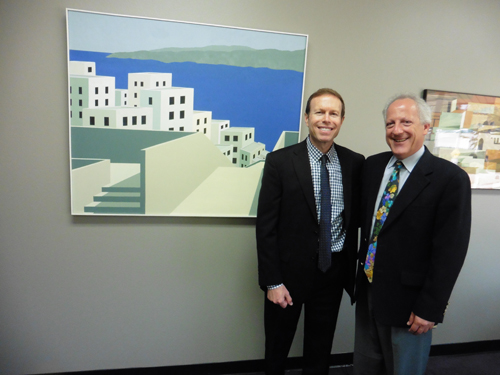
By Donald H. Harrison

SAN DIEGO – When Western journalists walk into the American Colony Hotel in East Jerusalem, as many of them often do, they will almost immediately be approached by several Palestinians guides anxious to help them develop their stories, says Aryeh Green, director of Israel’s MediaCentral.
Do the journalists need a translator? The Palestinians will provide one. Would they like to have dinner with a typical Palestinian family? It can be arranged. Is there any place they would like to be driven to? A car can be provided. Is there a Palestinian political leader or spokesman they’d like to interview? A few phone calls should do the trick.
Until some years ago, said Green, journalists did not find Israelis nearly so accommodating. If they were contacted at all by the Government Press Office it might have been to complain about a story they already had written or broadcast, but not to offer help on the next article.
Palestinians, in short, understood the game of cultivating the foreign media far better than Israelis did.
MediaCentral, a nonprofit, non-governmental project of Honest Reporting, was formed to help even out the playing field. Today MediaCentral provides knowledgeable and well-connected Israelis who are willing to help journalists arrange interviews, visit newsworthy sites, or meet typical Israeli families, Green said during an interview Monday, Sept. 15, at the offices of the Jewish Federation of San Diego County. However, Green added, MediaCentral is far from a mirror image of the Palestinian propaganda machine.
Here, he said, is the critical difference: While Palestinian escorts will guide journalists to people and situations that reinforce the Palestinian view of the conflict with Israel, MediaCentral will escort foreign journalists to anywhere they want to go, and help them speak with anyone they desire—even with Palestinian spokespersons, or others who are critical of Israel.
The reason? Green says that as long as journalists are given a chance to gather accurate information about Israel—and about its adversaries – the long range effect will be positive. Israel has nothing to hide, he declares. Its story, warts and all, is one that the country is proud for journalists to tell.
Even journalists who might have a built-in bias against Israel can be softened when they see the real facts on the ground, suggested Green during the interview that was held in the office of the Federation’s new senior director for community partnerships, Don Schlesinger. The two friends became acquainted during criss-crossing careers as Jewish communal workers.
Green told the story of a news crew from the English language Al Jazeera news service for which he arranged a tour of Sderot and Sha’ar Hanegev, the Israeli communities close to the Gaza border that have been battered by rockets fired by Hamas. The Sha’ar Hanegev municipality is the partnership region of the Jewish Federation of San Diego
The subsequent story about life under the rockets was quite sympathetic to the Israeli families who suffered constant bombardment, Green said. Although Al Jazeera by no means is considered friendly to Israel, this story, which aired in English, was quite sympathetic.
Besides being good guides and problem solvers, the small staff of MediaCentral also tries to correct common misconceptions about Israel. For example, said Green, although the Palestinian contention that Israel’s “occupation” of territories taken in the 1967 War is illegal, international laws harkening back to the fact that no true borders ever were established between Israel and its neighbors, argue to the contrary.
Green and MediaCentral don’t insist that journalists parrot or even accept their take on international law, only that they be aware that the legal issues concerning land claimed by both Israel and the Palestinian Authority are far from settled. He tactfully suggests a more neutral term might be “disputed territories.”
*
Harrison is editor of San Diego Jewish World. He may be contacted via donald.harrison@sdjewishworld.com